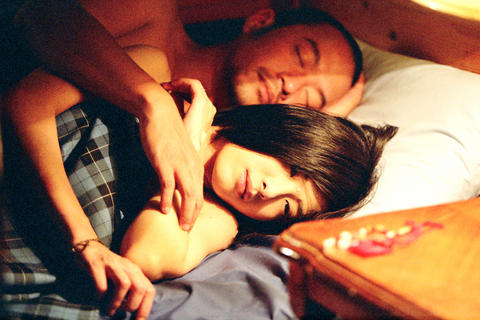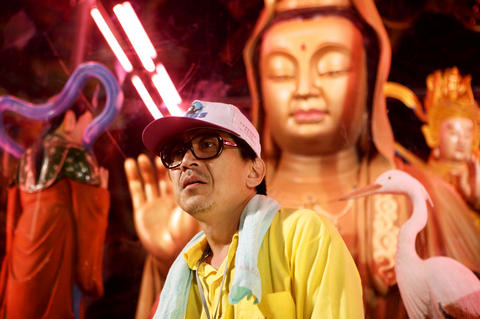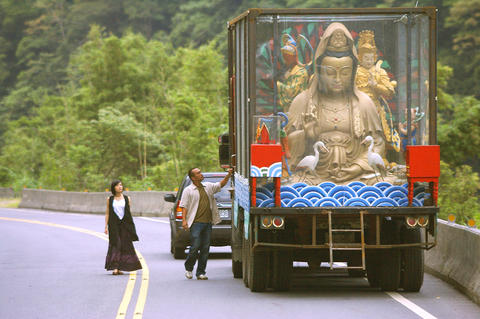Eight years after her critically acclaimed debut Bundled (我叫阿銘啦), director Singing Chen (陳芯宜) returns with her second feature, God Man Dog (流浪神狗人), an allegorical tale of contemporary Taiwan told through a mosaic of characters.
Blessed with a strong cast and production department, the film threads slices of Taiwanese life together with dreamlike visuals that linger in the mind long after the movie ends. God Man Dog has been well-received on the international film festival circuit and should also appeal to local audiences. It proves Chen, 34, is a promising, shining star among the younger generation of Taiwanese filmmakers.
The film follows the lives of characters from different ethnic groups, religious backgrounds and socioeconomic strata. It begins with Ching (Tarcy Su), a model suffering from postnatal depression who becomes increasingly estranged from her architect husband Hsiung (Chang Han) after their baby's death.

PHOTO: COURTESY OF 3RD VISION FILMS
Meanwhile, Aborigine Biung (Ulau Ugan) ekes out a living delivering fruit while attempting to cope with his alcoholism. His teenage daughter Savi (Tu Hsiao-han) escapes by becoming a kick boxer in Taipei and returns with expensive gifts after a friend enlists her in a scheme to steal money from the clients of a BDSM call-girl service.
In the third storyline, Yellow Bull (Jack Kao) drives a truck loaded with statues of deities who have been abandoned by their followers for not answering their prayers. Yellow Bull feeds stray dogs and takes in young drifter named Hsien, played by Jonathan Chang from Edward Yang's (楊德昌) Yi-Yi (一一), even though he hardly has enough money to replace his worn artificial leg. A car accident caused by a stray dog brings the three narratives together.
God Man Dog is technically accomplished and eloquently scripted. The film shows Chen as a surprisingly mature filmmaker who is able to look at the vices and virtues of Taiwanese society while telling an arresting story in a distinct style. It is an ambitious work that touches many issues, including the commodification of the body, the social problems faced by Taiwan's Aborigines, the anomie of city-dwellers, and the confused values of the young. Everything is tied together under a coherent structure by smooth editing and crosscutting between multiple characters and plot lines.

PHOTO: COURTESY OF 3RD VISION FILMS
Taiwan's collage of cultures finds a colorful epitome in Chen's vision, punctuated by the eerie sounds of a musical saw and cello by choreographer Sakamoto Hiromichi, of Hiroshima, Japan. Shen Ko-shang's (沈可尚) dynamic cinematography and atmospheric art direction by Huang Mei-ching (黃美清) help to fashion this visually imaginative film with a nod to magical realism: human-sized god puppets dancing in a deserted building, a neon-lit truck full of Buddhas wending its way through mountains under a dark sky.
On a narrative level, tragedy mixes with comedy. Storylines revolve around the film's central motif: how things are assigned value in Taiwanese society. "I reveal changing manmade values through items and things," Chen said. "Take the peach, for example. It is an expensive luxury in the eyes of Biung and his wife. In the film studio, it is merely something that can be consumed. But to Yellow Bull and Hsien, a peach is just a fruit to fill the stomach."
God Man Dog is laden with symbolism, but it is equally enjoyable for the entertainment seeker, with plenty of humorous moments of the kind that are rarely found in local productions. The most memorable of these come from the electrifying onscreen chemistry between veteran actor Kao and young Jonathan Chang. Kao shines in this film, breathing life into his Everyman role with a seemingly effortless, understated performance. Chang's equally eye-catching work suggests a star in the making. Pop idol-turned-serious actress Tarcy Su also turns in a convincing performance, although the plotline following the affluent urban couple is the film's weakest segment.

PHOTO: COURTESY OF 3RD VISION FILMS

Last week the story of the giant illegal crater dug in Kaohsiung’s Meinong District (美濃) emerged into the public consciousness. The site was used for sand and gravel extraction, and then filled with construction waste. Locals referred to it sardonically as the “Meinong Grand Canyon,” according to media reports, because it was 2 hectares in length and 10 meters deep. The land involved included both state-owned and local farm land. Local media said that the site had generated NT$300 million in profits, against fines of a few million and the loss of some excavators. OFFICIAL CORRUPTION? The site had been seized

Next week, candidates will officially register to run for chair of the Chinese Nationalist Party (KMT). By the end of Friday, we will know who has registered for the Oct. 18 election. The number of declared candidates has been fluctuating daily. Some candidates registering may be disqualified, so the final list may be in flux for weeks. The list of likely candidates ranges from deep blue to deeper blue to deepest blue, bordering on red (pro-Chinese Communist Party, CCP). Unless current Chairman Eric Chu (朱立倫) can be convinced to run for re-election, the party looks likely to shift towards more hardline

Sept. 15 to Sept. 21 A Bhutanese princess caught at Taoyuan Airport with 22 rhino horns — worth about NT$31 million today — might have been just another curious front-page story. But the Sept. 17, 1993 incident came at a sensitive moment. Taiwan, dubbed “Die-wan” by the British conservationist group Environmental Investigation Agency (EIA), was under international fire for being a major hub for rhino horn. Just 10 days earlier, US secretary of the interior Bruce Babbitt had recommended sanctions against Taiwan for its “failure to end its participation in rhinoceros horn trade.” Even though Taiwan had restricted imports since 1985 and enacted

Enter the Dragon 13 will bring Taiwan’s first taste of Dirty Boxing Sunday at Taipei Gymnasium, one highlight of a mixed-rules card blending new formats with traditional MMA. The undercard starts at 10:30am, with the main card beginning at 4pm. Tickets are NT$1,200. Dirty Boxing is a US-born ruleset popularized by fighters Mike Perry and Jon Jones as an alternative to boxing. The format has gained traction overseas, with its inaugural championship streamed free to millions on YouTube, Facebook and Instagram. Taiwan’s version allows punches and elbows with clinch striking, but bans kicks, knees and takedowns. The rules are stricter than the